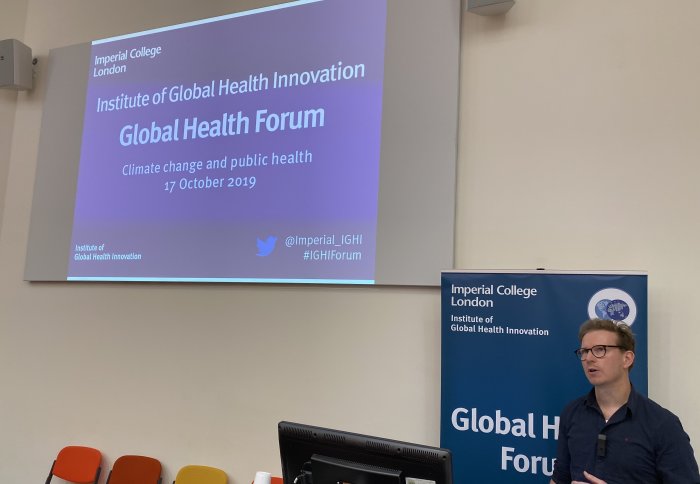How does climate change impact public health?

IGHI’s Global Health Forum returned last week to discuss the effects of climate change on public health.
The first Forum of the academic year, the Institute of Global Health Innovated teamed up with the Grantham Institute to explore this pertinent topic. In 2015, the Lancet Commission on health and climate change stated, “tackling climate change could be the greatest health opportunity of the 21st century” and the Forum’s panel certainly proved this.
The co-benefits of climate change action
Dr Neil Jennings, Partnership Development Manager at Grantham, opened the Forum with some important findings from the 2018 special report on 'Global Warming of 1.5°c', led by the Intergovernmental Panel on Climate Change. Current levels of global warming stand at 1°C, yet there would be stark implications if this were to rise to a 1.5°C or 2°C. Dr Jennings highlighted that “every fraction matters” and keeping global warming to a minimum could provide a multitude of benefits for societies.
As a co-author of the Grantham briefing paper on the ‘Co-benefits of climate change mitigation in the UK’ along with Dr Daniela Fecht, who was also a panellist, Dr Jennings’ talk drew attention to the findings of this research. Health and the NHS, immigration, security, the economy and housing could all benefit from climate action.
In particular with household energy, there were several knock-on effects. Improvements in energy efficiency would mean that families would find heating their homes more affordable, reducing the chances of poor physical and mental health, supporting better work and school attendance.
Early action
In 2008, the UK Climate Change Act set out plans to reduce carbon dioxide emissions by 80% by 2050. Geospatial Health Lecturer, Dr Fecht, presented findings on her work which quantified how changes in air pollution levels could impact our health.
The work, which is a part of the briefing paper delivered by Grantham, predicted the levels of air pollutants in different policy scenarios in 2035 and 2050. To meet the targets set for lowering carbon emissions by 2050, Dr Fecht felt we had to act with both speed and accuracy: “We need an early adoption of policies and we need to consider which policies are beneficial.”
Collaborating for climate action
The Forum highlighted that there are several research initiatives supporting climate action. Chairing the session, Senior Lecturer, Dr Kris Murray, explained the importance of projects such as the Lancet Countdown on Health and Climate Change.
A collaboration between 24 academic institutions and intergovernmental organisations, Dr Murray demonstrated how working together can help us to gauge our progress in mitigating climate change. Initiatives like this provide accountability against international targets, but also look at the day-to-day implications of climate change.
Dr Murray explained that there are five working groups making up the Lancet Countdown which range from health to public and political engagement, to economics and much more, showing how vast the effects of changes to our climate are.
Not just physical damage
While we seem more aware of the effects that climate change has on our physical health, the damage it's causing to our mental health is becoming more apparent.
IGHI’s Mental Health Innovations Fellow, Dr Emma Lawrance, labelled this “a new topical issue”. She said: “Most people don’t know the evidence behind mental health and our climate.” But Dr Lawrance highlighted that studies from the USA found that more people reported mental health issues when temperatures exceeded 30°C. Alarmingly, she added that increases in temperature can also drive up suicide rates.
The rise of this issue has given birth to a new vocabulary to communicate about it. Terms such as “eco-anxiety” and “eco-logical grief” are now being used to vocalise how climate change is affecting our mental health and wellbeing.
Dr Lawrance was clear that despite this emerging problem, there are still few statistics and we need much more insight: “What we need is more research, more awareness and more innovation.”
Join the conversation
This summarises just one of the many Global Health Forums that IGHI runs on a range of interesting and present global health topics.
Keep an eye on our website to find out more about the next Global Health Forum which will take place on 21 November.
If you’d like to hear more about research like this, sign up to our monthly Global Health Forums by joining our mailing list.
Article text (excluding photos or graphics) © Imperial College London.
Photos and graphics subject to third party copyright used with permission or © Imperial College London.
Reporter
Nikita Rathod
Communications Division